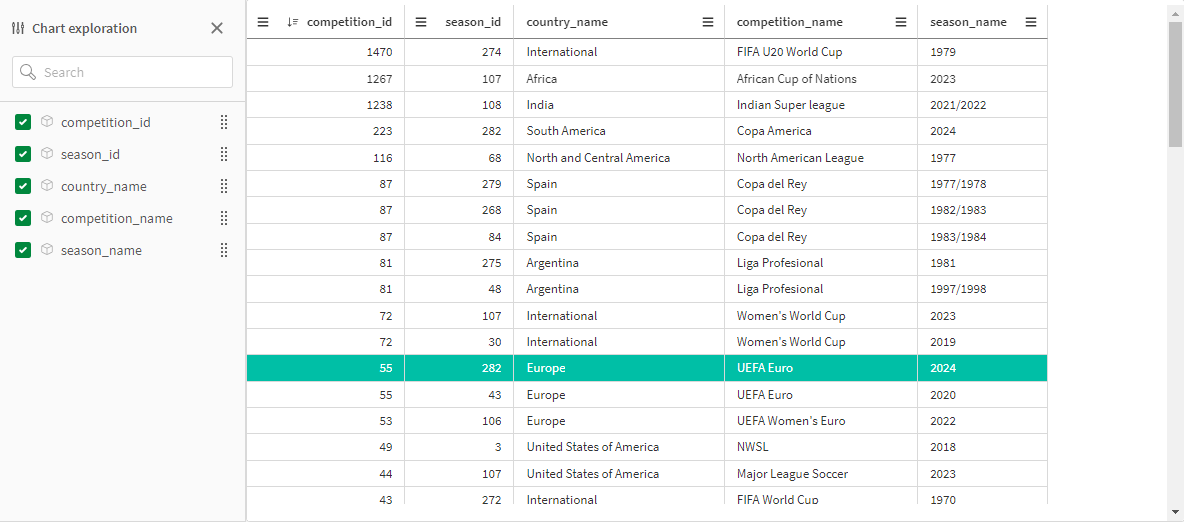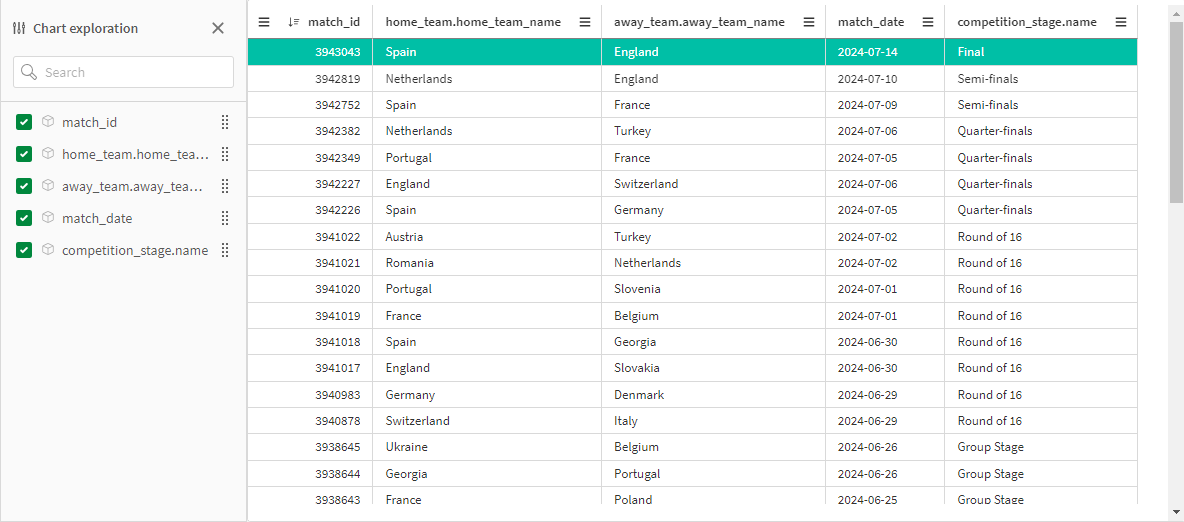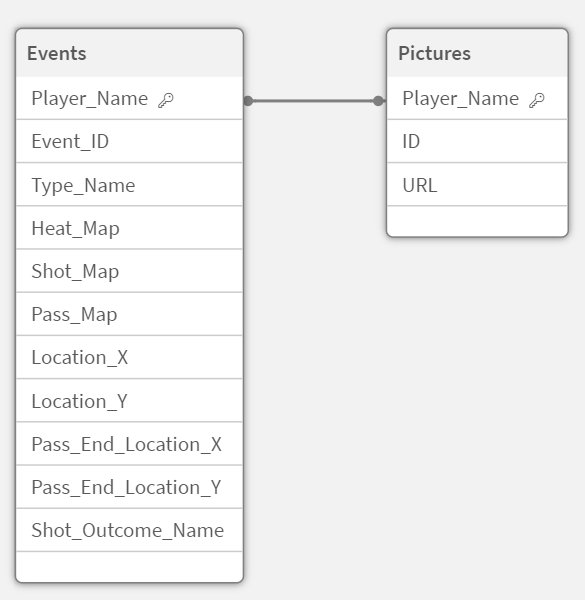I have watched football since I was a little kid. Around 25 years ago, in what can only be described as a moment of pure childhood genius, tiny me looked at all the football teams in existence and thought, “You know what would be fun? Supporting Leeds United!” Oh boy, have they delivered. Leeds have ruined more Saturday afternoons than I ever thought possible, leaving me questioning life choices and the meaning of loyalty.
Anyway, changing your football team is basically a crime, so I have to find other ways to cope. That’s why, to cheer myself up, I like to dive into the stats. But what’s even better is to analyze the data yourself. So when I found out that StatsBomb provide some free data, I had to check it out. In this blog series we will explore how to navigate through the StatsBomb files and create a simple Qlik Sense dashboard like the one below using only out-of-the box features. Trust me, this is much more fun than watching Patrick Bamford missing a sitter. As is tradition.
Accessing and loading StatsBomb data
StatsBomb offers free data on their GitHub repository, provided in JSON format. Luckily, JSON files are now supported in Qlik Sense so let’s load the key datasets: Competitions, Matches, and Events.
Competitions
To start, download competitions.json from StatsBomb’s repository and load it into Qlik Sense. Note that in this example the file is located in the Development space in a folder called StatsBomb.
Competitions: LOAD competition_id, season_id, country_name, competition_name, season_name FROM [lib://Development:DataFiles/StatsBomb/competitions.json] (json);
This file gives us a list of competitions with useful IDs. For example, if you want data from Euro 2024, look up competition_id (55) and season_id (282).

Matches
Now, with the competition_id and season_id, we can access match data. Navigate to data/matches/55/282.json in the repository. This gives you a match-by-match breakdown for your chosen competition. Download the file and load it into Qlik Sense:
Matches:
LOAD
match_id,
match_date,
home_team.home_team_name,
away_team.away_team_name,
competition_stage.name
FROM [lib://Development:DataFiles/StatsBomb/282.json] (json);
Identify a match_id for the specific game you want, say the Euro 2024 final, where the ID is 3943043. Now, we’re ready to dive into event-level data.

Events
With the match_id in hand, go to data/events/3943043.json to get granular details on each event (shots, passes, etc.) in the match. The JSON file contains a large number of fields, but for simplicity, we will only load the data we need. If you want to explore each field in detail, the documentation on StatsBomb’s GitHub page provides a comprehensive explanation of the available fields. Load the data as follows:
Events:
LOAD
id AS Event_ID,
type.name AS Type_Name,
player.name AS Player_Name,
location.0 AS Location_X,
location.1 AS Location_Y,
pass.end_location.0 AS Pass_End_Location_X,
pass.end_location.1 AS Pass_End_Location_Y,
shot.outcome.name AS Shot_Outcome_Name
FROM [lib://Development:DataFiles/StatsBomb/3943043.json] (json);
Pay attention to the way location and pass.end_location are loaded by extracting values from arrays. This technique ensures that the data is not loaded as subtables, making it easier to work with in your visualizations.
Enriching the data
As it is often the case, we need more data than what we have readily available. To create a heat map of each player’s activity, we need to specify which events to include. Let’s set up a mapping table for the relevant events:
Heat_Map: MAPPING LOAD * INLINE [ Event,Status Carry,Yes Pressure,Yes Dribble,Yes Shot,Yes Duel,Yes Foul Won,Yes Block,Yes Goal Keeper,Yes Dribbled Past,Yes Ball Recovery,Yes Ball Receipt*,Yes Miscontrol,Yes Dispossessed,Yes Foul Committed,Yes Clearance,Yes Shield,Yes 50/50,Yes Interception,Yes Pass,Yes Offside,Yes Error,Yes ] (DELIMITER IS ',');
As always, make sure to place the mapping table at the beginning of your script. Now, let’s apply the mapping to add a new field in the Events table. We will also create two additional fields – Shot_Map and Pass_Map – to track these specific event types.
Events:
LOAD
id AS Event_ID,
type.name AS Type_Name,
APPLYMAP('Heat_Map', type.name, 'No') AS Heat_Map,
IF(MATCH(type.name, 'Shot'), 'Yes', 'No') AS Shot_Map,
IF(MATCH(type.name, 'Pass'), 'Yes', 'No') AS Pass_Map,
player.name AS Player_Name,
location.0 AS Location_X,
location.1 AS Location_Y,
pass.end_location.0 AS Pass_End_Location_X,
pass.end_location.1 AS Pass_End_Location_Y,
shot.outcome.name AS Shot_Outcome_Name
FROM [lib://Development:DataFiles/StatsBomb/3943043.json] (json);
For this example, we also want to add pictures of the players and we will get them from the UEFA website. I hope they are happy with the mountains of cash they have made from their totally legitimate business activities and completely transparent financial dealings and won’t go after me for copyright infringement. Let’s add a new table:
Pictures: LOAD RECNO() AS ID, Player_Name, URL INLINE [ Player_Name,URL Álvaro Borja Morata Martín,https://img.uefa.com/imgml/TP/players/3/2024/cutoff/250024456.png Aymeric Laporte,https://img.uefa.com/imgml/TP/players/3/2024/cutoff/250027046.png Daniel Carvajal Ramos,https://img.uefa.com/imgml/TP/players/3/2024/cutoff/250024448.png Daniel Olmo Carvajal,https://img.uefa.com/imgml/TP/players/3/2024/cutoff/250081720.png Fabián Ruiz Peña,https://img.uefa.com/imgml/TP/players/3/2024/cutoff/250115436.png José Ignacio Fernández Iglesias,https://img.uefa.com/imgml/TP/players/3/2024/cutoff/1900122.png Lamine Yamal Nasraoui Ebana,https://img.uefa.com/imgml/TP/players/3/2024/cutoff/250176450.png Marc Cucurella Saseta,https://img.uefa.com/imgml/TP/players/3/2024/cutoff/250076168.png Martín Zubimendi Ibáñez,https://img.uefa.com/imgml/TP/players/3/2024/cutoff/250143679.png Mikel Merino Zazón,https://img.uefa.com/imgml/TP/players/3/2024/cutoff/250080572.png Mikel Oyarzabal Ugarte,https://img.uefa.com/imgml/TP/players/3/2024/cutoff/250097180.png Nicholas Williams Arthuer,https://img.uefa.com/imgml/TP/players/3/2024/cutoff/250163185.png Robin Aime Robert Le Normand,https://img.uefa.com/imgml/TP/players/3/2024/cutoff/250112513.png Rodrigo Hernández Cascante,https://img.uefa.com/imgml/TP/players/3/2024/cutoff/250082664.png Unai Simón Mendibil,https://img.uefa.com/imgml/TP/players/3/2024/cutoff/250076116.png Bukayo Saka,https://img.uefa.com/imgml/TP/players/3/2024/cutoff/250106939.png Cole Palmer,https://img.uefa.com/imgml/TP/players/3/2024/cutoff/250124282.png Declan Rice,https://img.uefa.com/imgml/TP/players/3/2024/cutoff/250083732.png Harry Kane,https://img.uefa.com/imgml/TP/players/3/2024/cutoff/250016833.png Ivan Toney,https://img.uefa.com/imgml/TP/players/3/2024/cutoff/250178523.png John Stones,https://img.uefa.com/imgml/TP/players/3/2024/cutoff/250064233.png Jordan Pickford,https://img.uefa.com/imgml/TP/players/3/2024/cutoff/250024791.png Jude Bellingham,https://img.uefa.com/imgml/TP/players/3/2024/cutoff/250128377.png Kobbie Mainoo,https://img.uefa.com/imgml/TP/players/3/2024/cutoff/250165175.png Kyle Walker,https://img.uefa.com/imgml/TP/players/3/2024/cutoff/250010259.png Luke Shaw,https://img.uefa.com/imgml/TP/players/3/2024/cutoff/250042705.png Marc Guehi,https://img.uefa.com/imgml/TP/players/3/2024/cutoff/250086928.png Ollie Watkins,https://img.uefa.com/imgml/TP/players/3/2024/cutoff/250150887.png Phil Foden,https://img.uefa.com/imgml/TP/players/3/2024/cutoff/250101534.png ] (DELIMITER IS ',');
Since the Competitions and Matches tables are no longer needed, you can comment them out. This will leave you with a tidy data model:

Now that the data is ready, it is time to dive into the fun part – creating visualizations. In StatsBomb x Qlik Sense – Part 2: Dashboard Design we will focus on building the actual dashboard and bringing the data to life.
